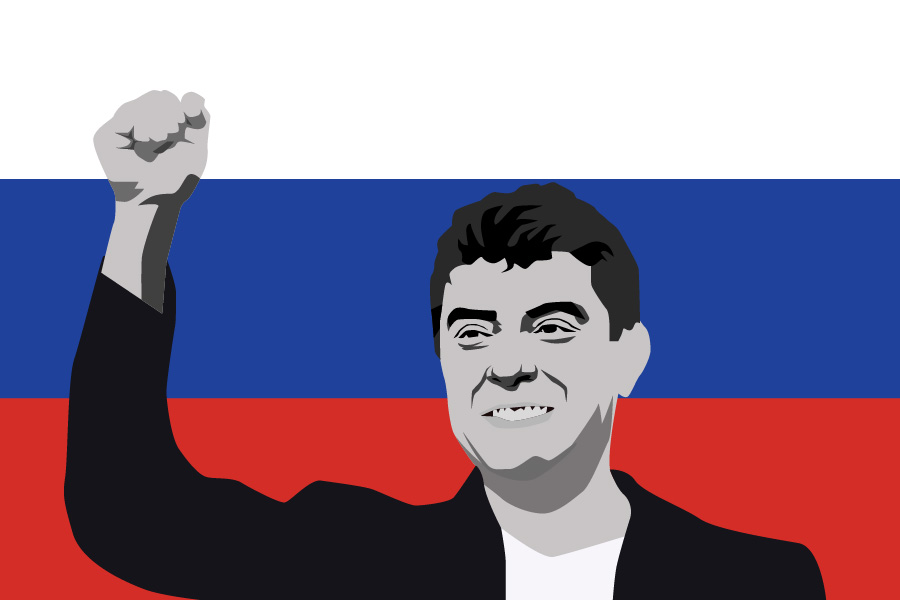
Political hits a reality, not fiction in Russia
 One February night in Moscow, a Russian opposition leader and his lover were walking home from a dinner date. As the couple crossed the Bolshoy Moskvoretsky Bridge, a large vehicle pulled up beside them, blocking the only working camera within range. Several gunshots rang out. Moments later, a single body lay on the pavement. The Kremlin loomed in the background.
One February night in Moscow, a Russian opposition leader and his lover were walking home from a dinner date. As the couple crossed the Bolshoy Moskvoretsky Bridge, a large vehicle pulled up beside them, blocking the only working camera within range. Several gunshots rang out. Moments later, a single body lay on the pavement. The Kremlin loomed in the background.
Boris Nemtsov, one of Vladimir Putin’s harshest critics, was assassinated almost three years ago. His death was mourned around the world and in Russia. Barack Obama condemned the killing and remembered Nemtsov’s “courageous dedication to the struggle against corruption in Russia.” Vladimir Putin issued his own statement, praising Nemtsov for leaving “his mark in the history of Russia.”
Nemtsov’s alleged killers — a band of Chechens — were jailed last year following a trial deemed farcical by some. But the late opposition leader’s name lives on somewhat closer to home. The Washington D.C. City Council recently announced that it had unanimously approved a measure renaming part of the street in front of the Russian Embassy in honor of Nemtsov — a slighting gesture against Putin and his increasing hostility.
Many observers think Putin was somehow connected to the murder, given Nemtsov’s fierce criticism of the president’s alleged corruption and his connection to Ramzan Kadyrov, the murky leader of Chechnya. The location of the murder — a mere glance away from Putin’s seat of power — stoked the flames.
These suspicions — of the type that hover around Putin’s crackdown of dissenters — have followed him for almost two decades in power. And while it’s unwise to zero in solely on the man in charge, assassinations more befitting a spy novel than real life are not uncommon in ways that raise eyebrows stateside.
Two of them occurred back in 2006. Anna Politkovskaya, a famed journalist noted for her coverage of human rights violations in Chechnya and distaste for Putin, was gunned down in her apartment building on — wait for it — Putin’s birthday. Less than a month later, a former Russian FSB agent-turned-dissident named Alexander Litvinenko was poisoned with radioactive polonium in London.
Litvinenko’s murder was more drawn-out than most — doctors failed to diagnose the lethal radiation circulating his body until three weeks had passed, by which time he was close to dying. Before he died, Litvinenko directed a damning statement to Putin, whom he accused of ordering the hit:
“You may succeed in silencing me but that silence comes at a price. You have shown yourself to be as barbaric and ruthless as your most hostile critics have claimed. You have shown yourself to have no respect for life, liberty or any civilised value. You have shown yourself to be unworthy of your office, to be unworthy of the trust of civilised men and women. You may succeed in silencing one man but the howl of protest from around the world will reverberate, Mr. Putin, in your ears for the rest of your life. May God forgive you for what you have done, not only to me but to beloved Russia and its people.”
Washington D.C’s decision to affix Boris Nemtsov’s name to a stretch of politically hot real estate solidifies the uneasiness so apparent in Russian-American relations today. It’s a stinging blow to the Kremlin.
It’s also a subtle jab at Donald Trump. His grudging acceptance of Russian sanctions and denials of election interference have placed him at odds with much of the political establishment. Trump has repeatedly denounced political critics echoing the activism of Nemtsov — a man truly passionate about his cause.
This is a measure that appropriates Nemtsov’s political opposition as more American than Russian — and more American than Trumpian.
Hits on journalists, politicians and ex-spies are extraordinarily rare in the States, of course, but remembering them helps us understand Putin’s centralized grip on power that is as disturbing to Americans as it is normal for Russians. In his travelogue Midnight in Siberia, David Greene reaches a point in his journey through Russia where he realizes “that Russians may well want — and get — something else” besides the “wisdom of America’s way of life and system of government.”
I’ll find out for sure when I get there.
Written by: Nick Irvin — ntirvin@ucdavis.edu
Disclaimer: The views and opinions expressed by individual columnists belong to the columnists alone and do not necessarily indicate the views and opinions held by The California Aggie.



